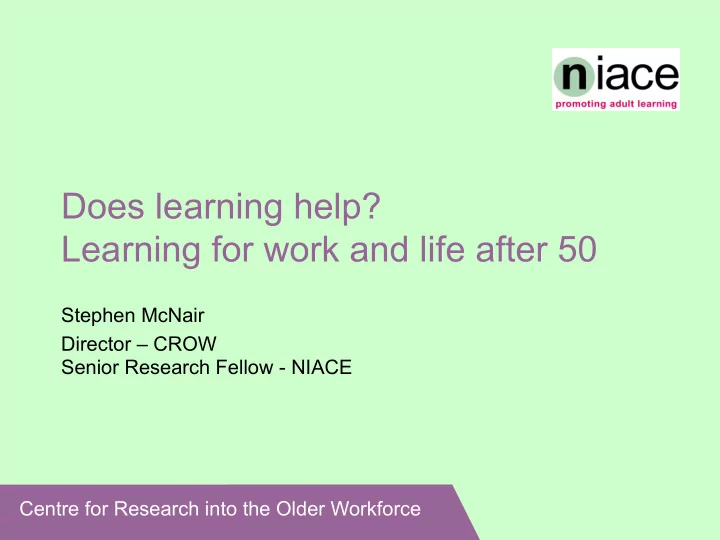

Does learning help? Learning for work and life after 50 Stephen McNair Director – CROW Senior Research Fellow - NIACE Centre for Research into the Older Workforce
The Learning and Work in Later Life project • What is the impact of learning on employment in later life? • Project funded by Nuffield Foundation • Planned by CROW at Surrey University • Delivered by CROW at NIACE • Changed methodology Centre for Research into the Older Workforce
Participants • Yanina Dutton - NIACE • Matt Flynn – CROW Surrey & Middlesex Business School • Tony Maltby - NIACE • Stephen McNair- NIACE • Lynda Owen-Hussey – CROW Surrey • Zeal Solutions – Leicester University Centre for Research into the Older Workforce
Contextual issues • Limited literature • Policy disjunction – age v education policy • Economic restructuring • Historical change and cohorts • Attitudes and discrimination – line managers • Economic context – labour demand and public sector retrenchment • Defining “training” and “skill” Centre for Research into the Older Workforce
What we did Centre for Research into the Older Workforce
1 Reviewing the field • review of relevant literature: – 23 academic databases – Keywords: age, training, 50+, retirement, work, later life, learning, older workers – CROW database (2500 documents) – 4777 documents, narrowed to 75 directly relevant, 37 post 2000 • review of the major relevant national datasets: – Labour force survey – Workplace employee relations survey – National adult learners survey – English longitudinal survey of ageing – NIACE annual survey of adult participation in learning – Also DWP research reports, European Social Survey, AARP, Campaign for Learning Centre for Research into the Older Workforce
2 Employee and employer perspectives • examination of employee perspectives through: – specially commissioned survey of the adult population (11,900 aged 18-69) – pilot interviews with older workers – secondary analysis of transcripts from CROW ESF/HE project • examination of employer perspectives through: – a secondary analysis of data collected in the Survey of Employer’s Practices and Preferences (SEPP) relating to age – secondary analysis of employer transcripts from qualitative element of the SEPP project. Centre for Research into the Older Workforce
3 Three omnibus surveys • Add two questions to – ONS Omnibus – NIACE annual adult learner survey – NIACE/CROW commissioned survey • “Have you been offered training in last 3 months, and if so did you take it up?” • “Do you think you are over or under skilled for your present job?” • 10,760 responses • 63% employed, 33% unemployed, 3% inactive Centre for Research into the Older Workforce
What we found Centre for Research into the Older Workforce
Learning declines with age (all forms) NIACE Adult learning survey 2011 100% 90% 80% 70% 60% No learning since FT education Learned more than 3yrs ago 50% Learning in last 3yrs 40% Currently learning 30% 20% 10% 0% 20-24 25-34 35-44 45-54 55-64 65-74 75+ Centre for Research into the Older Workforce
Type of learning changes with age Centre for Research into the Older Workforce
People rarely refuse training Centre for Research into the Older Workforce
Older workers don’t think they need training (at 50) Content Very overskilled Lifelong learners Underskilled Centre for Research into the Older Workforce
Patterns of training vary by sector Centre for Research into the Older Workforce
Training is stronger in the public sector Centre for Research into the Older Workforce
Length of training falls with age Centre for Research into the Older Workforce
Take up of training varies by occupational group Centre for Research into the Older Workforce
Training offer does not reflect perceived skill level Centre for Research into the Older Workforce
Skills and training by age Centre for Research into the Older Workforce
Who trains older workers? • Larger organisations • Public sector • High proportion professional/managerial • High proportion female • Implications in current climate? Centre for Research into the Older Workforce
What makes training of older workers more likely • Workplace culture • Perceived “career stage” • Past job mobility • Evident need • Cost effectiveness Centre for Research into the Older Workforce 21
Training and unemployment • Widely advocated, but little evidence • Training improves morale, but not employability • Need for good advice and guidance • Attitudes • Importance of embedded learning • Waiting periods do not help Centre for Research into the Older Workforce
Why is demand for training low? Five hypotheses 1. Underestimating future needs 2. ‘Conspiracy to underperform’ between workers and line managers 3. Poor management, making poor use of the latent skills of employees; 4. Perception of a low return on the effort and costs 5. Overvaluing formal qualifications Centre for Research into the Older Workforce
Conclusions • Little perception that there is a problem • Little formal assessment of cost-benefit • No simple reason for decline in training • High training sectors/occupations continue to train • Length and nature of training changes Centre for Research into the Older Workforce
Policy implications • Recognise diversity • Promote positive images of age • Promote learning for resilience • Promote benefits of training to employers • Link skills and age policies • Train/support most vulnerable at 50 • Improve performance review/appraisal • Further research on benefits Centre for Research into the Older Workforce
Research areas • costs and benefits of training/qualifications, to individuals and firms • segmentation of the older workforce in motivation to work and learn • how older people understand and manage work-life balance • how training can best combine with other strategies like work placements to help unemployed older people • how communication about career happens between older workers and employers, • the experience and aspirations of older BME workers • factors influencing individual retirement decisions • types of flexible working arrangements: their appeal and implementation Centre for Research into the Older Workforce
CROW: www.olderworkforce.org.uk Centre for Research into the Older Workforce NIACE 27 WBL
Recommend
More recommend